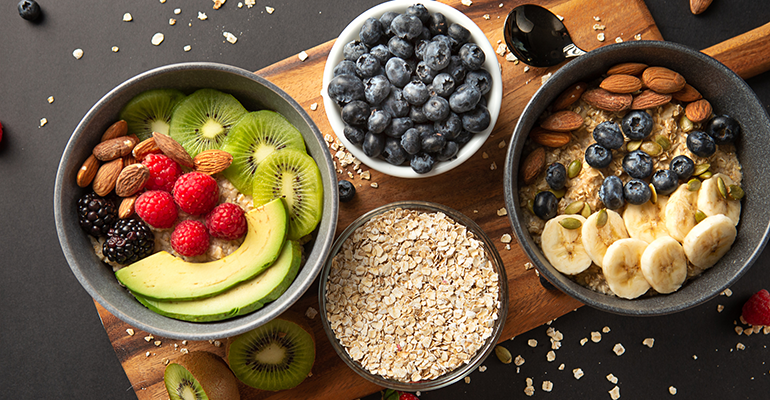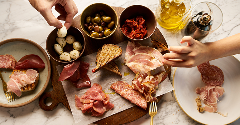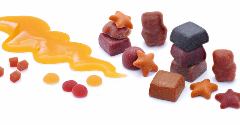News
Science is critical to creating complete nutrition products, says Huel co-founder
19 Feb 2024Consumers need access to science-based facts in order to make informed nutritional choices, says James Collier, co-founder and nutritionist at meal replacement startup Huel – but communication can be tricky. “One challenge is that Covid-19 has sent a lot of people into an anti-science mindset,” he says.
Huel’s mission statement is to make nutritionally complete, affordable food, with minimal impact on animals and the environment. With this as a guiding principle, the company has emerged as a leading innovator in the no-prep meal space, delivering products that include powders, protein shakes and bars.

“The term we use is nutritionally complete food,” says James Collier, co-founder and nutritionist, Huel, who will be speaking at the Vitafoods Europe conference and the Future of Nutrition Summit in May. “Everything that you need nutritionally is in our products, such as the right amount of protein, fibre, carbs, and fatty acids etc.”
The company also recently expanded its offerings to include a vitamin and mineral drink containing fibre.
“One of the things that makes us different is that we use whole ingredients wherever we can as the basis for what we do,” explains Collier. “We want to offer everyone the flexibility of having a nutritionally good, convenient food option.”
Communicating in a contentious nutrition space
A consistent challenge in this increasingly crowded - and sometimes contentious - innovation space is reaching consumers with science-based facts. Collier highlights the role of social media - and certain influencers in particular - in spreading misinformation about nutrition. This can often be hard to counter.
“We are science-led, have tried to connect with consumers through being honest from day one,” says Collier. “One challenge now is that the Covid-19 pandemic has sent a lot of people into an anti-science mindset.”
Collier points out that people increasingly want quick, hard facts when the complexity of an issue can be incredibly difficult to grasp. And while science is about the continual pursuit of truth, changing the opinion of people who are increasingly led by ideology, rather than genuine inquiry, can be a Herculean task.
Challenging the definition of UPFs
One particular area that Collier believes requires more rigorous and honest debate is around Ultra Processed Foods (UPFs). In an in-depth article on this subject, he challenges the definition of UPFs under the NOVA categorisation. A key element of Collier’s argument is that a food containing a single so-called UPF ingredient – but that is otherwise nutrition-rich and packed with quality ingredients, such as fibrous cereals, fruits or nuts – should not be tarred with the same brush as foods that are high in sugar and lacking in key nutrients.
A key problem here, Collier believes, is that the UPF definition directly conflicts with other nutritional goals.
“We all agree that we are not getting enough dietary fibre,” he says. “This is critical for digestion, mental health, and the microbiome. Breakfast cereals like Shredded Wheat, Shreddies and Weetabix are all excellent sources of fibre, but would come under the UPF definition. These products I think are a great example of where the UPF argument falls down.”
Collier subscribes to the view that food should be seen as more than the sum of its parts, and that nutritionists should resist the temptation of trying to put everything into boxes. He believes that the NOVA definition of UPFs has value but should be confined to academia. “The ultimate casualty of all this are the consumers,” he says. “What we need to do is take into account the whole picture.”
 © iStock/Yulia Panova
© iStock/Yulia Panova
Part of a sustainable food system
This view informs Huel’s holistic approach to nutrition, and Collier identifies five key pillars that his company strives to address simultaneously: eating for physical health; eating for mental health; sustainable nutrition; ethical eating; and eating with other people. “I intend to cover this during my talk at Vitafoods Europe,” he says. “We need to be thinking about sustainable nutrition, because what we eat affects others. And a diet isn’t sustainable if it can’t sustain an individual.”
Collier sees Huel as one part of a more holistic, sustainable food system, capable of providing nutrition to a growing population without unduly harming the planet. In order to tackle greenhouse gas emissions we need to eat less meat, he says – but that doesn’t mean cutting out meat altogether. There are issues surrounding GMOs, such as their potential impact on soil health, but that doesn’t mean they have no part to play in helping to feed the planet. (All Huel products are non-GMO).
“This is where Huel and other complete food solutions come in,” says Collier. “We are just one part of the solution. We are not trying to be another food, but rather a different format of food. And we are constantly working hard to be more sustainable.”
Related news

UK Government overhauls childhood obesity strategy
21 Nov 2025
The UK Government has announced a new package of measures designed to reverse the nation’s childhood obesity epidemic following the release of statistics revealing the scale of the crisis.
Read more
Nitrites: Pressure grows on UK to follow EU’s lead
20 Nov 2025
Pressure is growing on the UK to follow the EU’s lead after the bloc revised its regulations on the permitted levels of nitrites and nitrates in cured meats.
Read more
From fruit to functional solutions: Meet Paradise Fruits at Fi Europe in Paris
13 Nov 2025
Paradise Fruits Solutions and Paradise Fruits Health will showcase their combined expertise in delivering innovative, fruit-based solutions to the food and beverage industry at the upcoming Fi Europe trade show (2-4 December 2025, Paris).
Read more
Danone highlights digestive health as potential ‘tipping point’ for food industry
13 Nov 2025
Danone is betting on a food industry “tipping point” that will bloat the market for healthy products, particularly those related to gut health.
Read more
Soy story: WWF scores UK supermarkets on sustainability efforts
12 Nov 2025
WWF has published its latest “Soy Scorecard”, ranking UK supermarkets’ efforts to combat deforestation and land conversion in their soy supply chains.
Read more
New UPF standard hoped to offer consumers ‘coherence and clarity’
10 Nov 2025
Ingredients companies are being urged to enter “a new era of partnership and innovation” following the launch of the industry’s first non-UPF verification scheme.
Read more
Whistleblowers accuse UK meat industry of promoting cheap, unsustainable supply
7 Nov 2025
An anonymous group of industry insiders has accused the UK’s biggest food companies of systematically driving down meat quality and welfare standards.
Read more
Cottage cheese makes a comeback as consumers call for cleaner labels
6 Nov 2025
From ice cream to dips and ready meals, cottage cheese is experiencing a renaissance as a high-protein, clean ingredient for health-conscious consumers.
Read more
Bord Bia presents Irish dairy ingredient suppliers at Fi Europe
6 Nov 2025
Dairygold Co-operative Society, The Carbery Group, and Ornua Co-operative: Meet with sustainable producers of Irish dairy ingredients at Food ingredients Europe 2025, Hall 7.2 Stand M18.
Read more
Ingredient quantities mislabelled on popular protein bars, independent tests show
5 Nov 2025
Some popular protein bars contain more fat, carbs, and/or sugars than claimed on their labels, independent nutrition testing reveals.
Read more